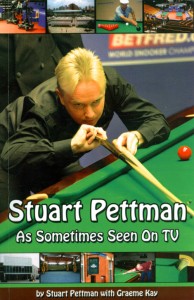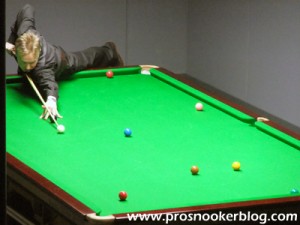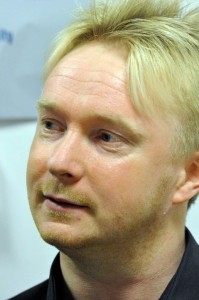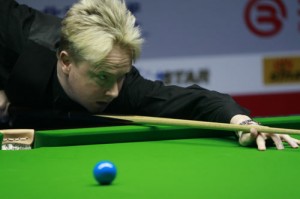
As regular readers may be aware, former China Open semi-finalist Stuart Pettman has been working on his book which I am pleased to say is now available to buy via this website. For more information please click here.
With that in mind, I caught up with Stuart recently to talk to him about the book, as well as his 2010/11 campaign and his plans for the future now that he will not be on the professional circuit next season…
PSB: So Stuart, your book ‘Stuart Pettman: As Sometimes Seen on TV’ is out now. What led to your decision to write a book and what is the main focus of it?
Stuart Pettman: Yeah, originally it was Graeme’s idea when we were both in Thailand. We were just talking about general snooker books that are out there and we said that they all seem to be either autobiographies of players or they are snooker coaching books.
There is nothing in between really for the snooker fanatics who want to know the answers to a fair few questions; for example, what’s the difference between amateur level and professional level? What goes through a professional’s mind on tour? What they get up to, basically things like that.
We thought that it would be a good idea to do something different and it is definitely different. We talk about general life in a snooker club as well as the pro game and what goes on in a snooker club with various characters, so that’s why we decided to do it.
It was originally planned, if you will, to follow through the 2009/10 season – wherever I went we would do a piece and hopefully delve into all the side topics that crop up in the course of a season. Not just like a short story about what I’ve done but how things happen and how we get to these places, who pays for various things, what goes on in preparation, highlight what went on in the matches, not particularly to talk about ‘I won this one with a 66 break’ as that’s fairly boring stuff, I think I just wanted to do something on a different scale. So I think we have done that quite well.
PSB: What do you hope that snooker fans take from the book? Why should they buy it?
SP: At the end of the day we’ve both enjoyed doing it and so even if nobody buys it we’ve still enjoyed doing what we have done and we think that we’ve put something that is totally different to anybody else.
I’ve not yet read Graeme Dott’s book that has come out but that’s an autobiography whereas mine isn’t; you know I haven’t done enough in the game to warrant that. Obviously it’s about my experiences, but it’s more about the game itself. Usually if you read an autobiography you learn a lot about that one player’s life. If you read mine you’d probably get more of an insight into what every player goes through. Any questions that people need answering about what are the balls like, what is the lighting like, how are the tables different to club tables, how do we play certain shots or what we think about at the table – all of the answers are in there and a few practical tips as well for anyone that is interested in improving their game.

PSB: How easy did you find the task of putting your experiences onto paper?
SP: You would probably have to ask Graeme that question as he had the job of putting all the ideas into words. It was all my content and my experiences that I told Graeme about. We would spend a fair few hours talking about it, Graeme would put it on paper, we would do sections at a time on various different subjects and we would put them together at the end and it worked really well.
Graeme Kay: It wasn’t too difficult. We just spent a lot of time talking about snooker, watching snooker, playing snooker, recreating situations on a practice table, and then I’d write up what we’d discussed. Then Stuart would go over it and we’d have a chat about what changes we needed and I’d keep re-writing it until he was happy with it. If you can imagine though what it would be like to have access to a professional snooker player for a year and to be able to watch his matches and ask him absolutely anything about the game then you can understand why it might be a lot of fun. The hardest bit was probably having to phone him immediately after he’d blown another decider in qualifying, demanding to know if he’d twitched or not and exactly how bad he felt about it. But it had to be accurate and honest or there’d be no point.
PSB: Looking back at the 2010/11 season, it has on the face of it been a season to forget for you personally. What do you put that down to and how do you feel about losing your tour status?
SP: Basically that was a knock-on effect from the World Championship for me. Playing so poorly at the Crucible completely mashed my brain, it was almost like I’d rather have not qualified because I had performed so badly and the very next tournament I played in I missed match ball against Maguire.
A combination of those things and the knock backs that I have had recently when I have been on TV recently and not been able to perform I just kinda feel then why am I putting myself through this? I’m getting to an age now where I know that I’m not going to achieve what I set out to achieve otherwise I would have done it before now and I kinda just thought that I need a break from the game so that’s why I didn’t enter eight tournaments this year.
I knew that I didn’t want to play the following season so I didn’t see any point at all of travelling to the tournaments that I didn’t need to do. So that is why I haven’t practised at all throughout the season, I think I put in two or three days for the World Championship which is ridiculous. If you are going to put that kind of preparation in then there is just no point. If your heart is not in it as mine hasn’t been for various reasons then there is just no point, you need to take a bit of time out from the game and I would advise anyone else who feels the same to do the same because in a year’s time I might miss it so much and have the passion to do it.
But as for now I’m very happy with the decision that I have made and I’m sticking to it so I am off to the Far East for three months, travelling around for a bit and doing what I want to do because I have never been able to do anything like this before because of commitments to the season. You can’t be away for so long because obviously you need practice, tournaments to play in pretty much straight away and I’ve never been able to do this so that’s pretty much what I’m going to do.
The other thing as well is that I’ve got a snooker club and so to commit myself to 19-20 tournaments to be away for all that time is not good as well so that was another factor that came into it.

PSB: So you will not be entering the Q School?
SP: Oh no, I will not be entering that. I will possibly enter it next year but this year I am off to the Far East to pick up a 9-ball cue and see how that goes, I’ve already been invited on the GB9 tour for that but it’ll be a bit of fun for me, see how it goes.
PSB: As well as playing, you do have the Elite Snooker Club in Preston to handle, the club that you have owned since 2006 with fellow professional Shokat Ali. The subject of much discussion in your book, is that something that you are still enjoying?”
SP: I enjoy it, you always have a good laugh with all the regulars and to me when I lost in the World Championship to [Alan] McManus I wasn’t disappointed, it was almost like a big relief, like ‘thank God for that, that’s over, new part of my life is going to start.’
PSB: I thought that you were going to come back and win too…
SP: I know, I just went all out for it. I was 7-4 down and thought I’m not going to go out like this and went for everything, everything went in and it went 8-7. He then played two great frames and kept me out to go 9-8 and I should have made it 9-9. I had a chance in the last frame, the brown just curled out at the last minute and stopped over the pocket and handed him the match. I thought I might as well go for it as I might not get another chance.
PSB: Longer term, could we see you back on the professional circuit at some point?
SP: I’m fairly sure I could do it if I put the preparation in, the proper preparation. I’m sure I could get back in. It’s just a question of whether I want to or not.
In another couple of years, or next year, do I want to enter the Q School? If I get back on the main tour I might rekindle a bit of passion for the game. I don’t know but at the end of the day I can only see there being more tournaments in two years so it’s whether I want to commit to that again, I don’t know.
If I do then I could be back on the main tour and I would probably only enter the major ones, I don’t think I would enter the PTCs to be honest but if you don’t enter them you’re pretty much history unless you do well in the major ranking tournaments. Just take Ronnie, obviously he can pick and choose what he enters but I have spoken to quite a few players and obviously 19 tournaments is great for some players and not great for others who have got a lot of, or other commitments.

Photo courtesy of Monique Limbos
PSB: What of the other changes currently going on in the professional game? What do you think of the direction that the game is heading in?
SP: I think that the direction it is heading in is very good.
The only thing that I would disagree with is the fact that the Q School, the number of entries that they have received is absolutely scandalous, 109 I think plus whoever comes off the main tour, so you are probably going to get a 128 field.
Personally I think that the reason for that is that the people who go to Q School or those who are thinking of doing that, they know that if they qualified for the main tour, to stay on tour they probably have to come up with £10,000 in expenses, that might be a bit on the high side but it won’t be far off that.
Now if they want to be earning a living in the game then they are going to have to be earning £30,000-£40,000 which is very, very hard as the game today is of a ridiculously high standard. For an amateur to come onto the tour and earn that kind of money is not likely to happen so I think that the money situation in the lower ranks of the game is fairly poor. I think it’s geared up to an extent so that the money is for the top 32 to make a good living. I think that’s the problem, if I could change anything then that would be it.
PSB: I agree but it’s easier said than done I guess…
SP: Take a look at the Q School, why can’t they give them £5,000, something that they are guaranteed because they are one of the best players in the world, they deserve something for their efforts which would take a bit of the pressure off and give them more interest to get on the tour as well. If they are getting £128,000 then they could use that money for the people who qualify, help them on their way, that’s my view on it.
Another way they could do it for the PTC’s is to count your best eight from the 12 because you are held to ransom if you want to progress up the rankings, you have got to go and play in them so at least this way you have four tournaments that you don’t need to play in, that you could re-arrange or don’t feel committed to play in them

PSB: Finally, what will be your greatest memory from your professional career? China 2009 must be a contender?
SP: Yeah that was perfect, I went into the tournament and it was one of the only times I felt like I could win a tournament, it was a great experience and I’ll never forget that.
I can’t really say that my career highlights have been qualifying for the Crucible because they haven’t. OK, everyone says to me ‘oh but you’ve qualified, surely you count that as a major achievement?’
I don’t look at it like that, I just see that I’ve qualified for another tournament and to play there, the first time was great, the second time was awful, the third time was worse and I’d rather not have played there the last two times just to make yourself look like an idiot. I don’t really fancy doing that so I can’t really count that as a career highlight.
So yeah, definitely the China Open semi-final, the China Open tournament in general was a career highlight for me.
PSB: I remember you gave Ronnie a good game at the start of that season as well…
SP: Yeah I remember beating Ronnie in China once as well. When he didn’t turn up. That was a career highlight as well!
PSB: What was it about 2009 that week? Was it just the circumstances, the way you played?
SP: I just felt great, I just felt complete with my game. I’m always tinkering with my game, all the time, probably because I don’t practice that much. I just think ‘oh well, I’ll try something different this week or this month’ or whatever and I never really get into it that much.
But for some reason that week I just felt absolutely great, I cleared up well, I remember beating Ali Carter who was world Number One at the time and I was by far the better player and then all of a sudden I was getting through to the next round and then the next round and I just felt great.
Eventually I came up against [Peter] Ebdon in the Semis, who I felt was extremely lucky, although he played pretty well but yeah, can’t complain about that.
Stuart’s book is out now, for more information please click here…